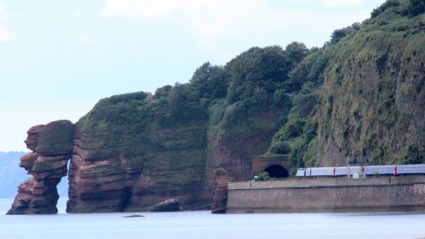WKU News
Keeling presents research at Royal Geographical Society conference
- Thursday, September 10th, 2015
Dr. David Keeling, University Distinguished Professor of Geography and Head of WKU’s Department of Geography and Geology, attended the annual conference of the Royal Geographical Society Sept. 1-4 at the University of Exeter.

A cross-country diesel-driven passenger train heads south past Dawlish, Devon, passing heavily eroded Jurassic-period sandstone cliffs in southwest England. Dr. David Keeling attended the Royal Geographical Society conference that was held nearby at the University of Exeter.
He presented the results of research on Argentine national identity that will appear as a chapter in a forthcoming book titled “Scaled Identities and Nationalism,” to be published by Rowman and Littlefield. His paper, titled “Territory and National Identity in Contemporary Argentina,” was one of five presentations in a session that addressed “Knowledge, Governmentality and Power.” This broad theme is especially relevant these days with the ongoing political crises in the Middle East and concerns about how language, religion and ethnicity can shape identities in negative and destructive ways.
The overall theme of this year’s RGS conference focused on addressing the challenges of the Anthropocene. The Anthropocene is a term now widely used within and outside research communities, and has been re-interpreted to mean many things to many people. But the core meaning is strongly grounded in Earth Systems and Environmental science.
The Anthropocene refers to a new epoch in Earth’s history, but one that is not due to the natural swings in Earth’s environment but rather to an accelerating set of human pressures. The advent of the Anthropocene raises a profound dilemma for humanity. A business-as-usual socio-economic trajectory creates large risks that humans may destabilize their own planetary life-support system. In the 21st century, are we really headed for a bright future of development, wealth creation, with plenty for everyone on the planet, or are we headed for global collapse? The signs are equivocal but not encouraging, but we’ll almost surely know the answer by the middle of the 21st century, if not before.
At WKU, faculty and students in the Department of Geography and Geology are taking an innovative and progressive approach to addressing the challenges of the Anthropocene, with exciting initiatives like the CHAOS lab, the summer Storm Chase program, the new Center for Human Geo-Environmental Studies, partnerships with Iceland, Belize and the Caribbean, along with much, much more.
While in Exeter at the conference, Dr. Keeling also continued work on research that compares the carbon footprint of public transport to that of private automobiles as part of a larger study that argues for more sustained and targeted investment in alternative mobilities. Many rural communities in both developing and emerging societies continue to struggle to build connections with the wider regional and international markets that can help drive economic prosperity.
Contact: David Keeling, (270) 745-4555
Some of the links on this page may require additional software to view.

